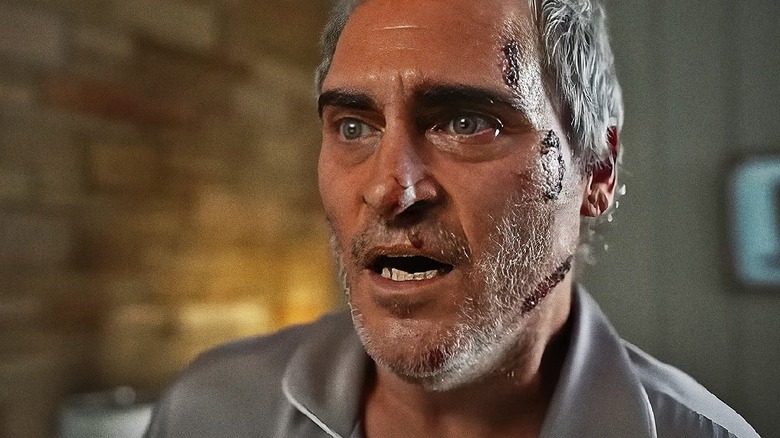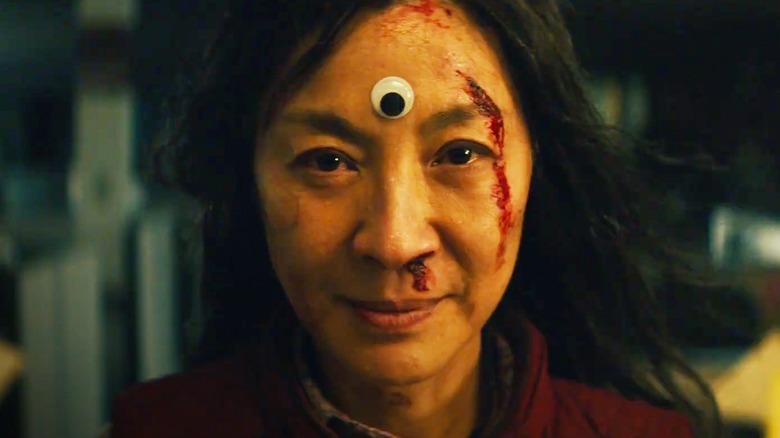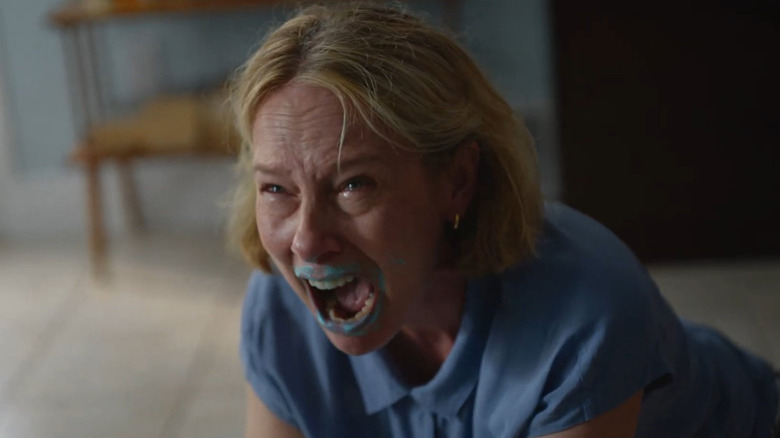Beau Is Afraid Proves That Bizarre Indie Flicks, Not Blockbusters, Will Save Movie Theaters
Even before the COVID-19 pandemic, people were concerned about the future of movie theaters. With the rise of streaming, there was the looming question of whether audiences would still feel as compelled to dish out money to see something in theaters, or if they'd wait to watch it from the comfort of their homes (at a much lower price point). Post-COVID, there have been plenty of successes, like "Top Gun: Maverick" and "Avatar: The Way of Water," but many films have fallen short, and attendance is still below pre-pandemic levels.
It'd be easy to assume movie theaters will only remain afloat thanks to blockbusters, but there could be another knight in shining armor to help theaters move forward — and the answer lies in getting really, really weird with it.
Ari Aster's latest horror-infused panic attack, "Beau is Afraid," starring Joaquin Phoenix, opened in four theaters in Los Angeles and New York on April 14, grossing an average of $80,099 per location. That's the best per-theater average of the year so far, and it's from a film that received a pretty mixed response from critics. However, the financial reception the film has received so far suggests audiences have a fierce appetite for off-kilter projects.
It remains to be seen how "Beau is Afraid" performs when it's released in more theaters around the country, but so far, this suggests a trend of strange indie projects being able to get butts in seats in way that, for instance, rom-coms just aren't doing these days. The movie's success thus far also defies conventional Hollywood wisdom to play it safe. Perhaps, to save theaters, the opposite is true — and the key is to give viewers something they haven't seen before, by investing in directors with visually distinctive, unique visions that hold people's attention.
Beau is Afraid proves that weird cinema is what people want
It goes without saying that massive blockbusters aren't going away, and studios will absolutely still pursue them because of the immense box office potential. No one's going to turn their nose up at more "Avatar" when each one could feasibly gross over $2 billion in theaters. Furthermore, for all the panic buttons that keep getting pressed, movie theaters aren't going to go extinct — even in worst-case scenario, companies like Disney or Amazon could purchase them to keep them afloat. Smaller movies, though, are just as necessary. And and if trends are any indication, the stranger could be for the better.
"Everything Everywhere All at Once" is a great example. It's a film about generational trauma utilizing the multiverse, packed full of wild ieas, that grossed nearly $140 million worldwide, which includes its re-release in the lead-up to awards season. The same holds true for "Skinamarink," which grossed $2 million in theaters but only had a budget of $15,000. Both films were completely original ideas, and they both garnered strong word-of-mouth, allowing them to make good on their respective smaller budgets.
Indie films may not get the same kind of marketing budget as "Guardians of the Galaxy Vol. 3." That means, when it comes to convincing audiences to shell out money for tickets, it's all the more important to have an enticing hook. Something that trends on social media — like people sharing negative reviews of "Beau is Afraid" which make it sound positively vile — gives these movies inherent free publicity that they wouldn't have gotten otherwise.
However, that kind of talk only comes from something no one has seen before. For a success in this space, a studio can't play it safe. They need to do the opposite of their intuition, and to embrace risk.
Bizarre films like Everything Everywhere All at Once and Beau is Afraid get people out of the house
There are many reasons why people flock to blockbusters by the millions. They become attached to characters who span multiple films, for one, and they generally know what they're going to get. However, another perhaps overlooked reason could be attributed to viewers wanting to be part of the cultural conversation. "Top Gun: Maverick" had such long legs because everyone was talking about how it was so much better seeing it on the biggest screen possible.
Indie films need to adopt this approach. There needs to be a reason for the everyday, casual person to see them on the big screen (and no, a desire to support indie films isn't good enough). Getting a little weird with it is the perfect solution.
"Everything Everywhere All at Once" was so bizarre people had to see it for themselves to know what everyone else was talking about. The same could hold true for "Beau is Afraid." The mixed reception isn't just that a few critics said they didn't like it — it's that they have such a visceral hatred toward the movie that, frankly, it makes "Beau is Afraid" sound pretty rad. Regular audience members will likely have a strong reaction to it, too, one way or the other. It's not something you're going to watch and immediately forget it. You'll either rave about it to your friends, or you'll go on a long-winded Twitter rant about how it wasted three hours of your life. That's what indie films need to do.
No matter the ultimate opinion, the person took a chance on an indie film because it sounded weird. Everyone else was talking about it, so they wanted to join in, even if they shared a different viewpoint than their friends.
Beau may be afraid, but studios shouldn't be
Movies like "Beau is Afraid" and "Everything Everywhere All at Once" prove there's a market for films that stretch the limits of one's imagination. It's a clear sign that studios need to start getting freakier, because even movies one would consider safe bets aren't really hitting their strides. 2023 has opened with two superhero movies failing to meet expectations — "Ant-Man and the Wasp: Quantumania" (which grossed under $500 million) and "Shazam! Fury of the Gods," (which notoriously flopped hard).
That's not to say franchise films will go away entirely. "Avatar: The Way of Water" grossed over $2 billion, so Disney isn't going to let that well dry up any time soon. However, even that film comes from an auteur like James Cameron, who elevated the material beyond standard sci-fi action fare. When it comes to smaller movies, which may not bring in $1 billion but have smaller budgets and can turn a neat profit, the key may be to follow in those footsteps and give audiences something they haven't seen before, especially if it's weird and polarizing.
People have more options than ever before. They can watch anything, new or old, on streaming services, and they know that most movies will end up on one of those platforms within a couple of months of its theatrical release. To actually get people to turn out in theaters, studios need to take the sorts of big, bold risks they've historically been so uncomfortable with. It remains to be seen if "Beau is Afraid" will turn a profit, especially considering its $35 million budget. But its limited-release success suggests people aren't afraid of controversial weirdness. In fact, it may be what helps smaller-budget pictures get off the ground.



